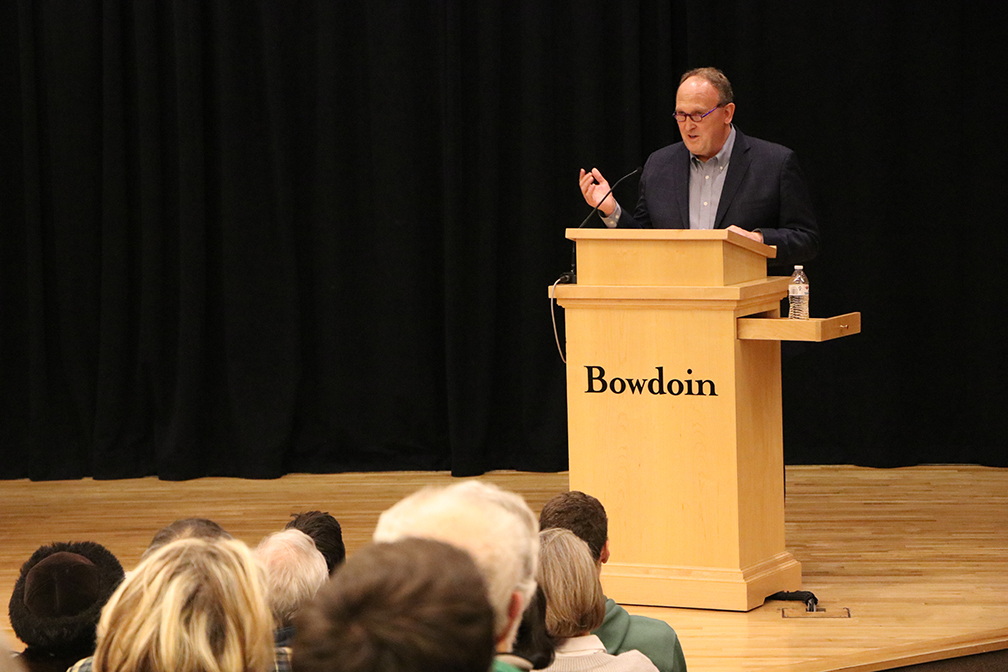Pulitzer-winner on career in international journalism
February 14, 2020
 Natsumi Meyer
Natsumi MeyerFrom Cuba to Saudi Arabia, Kevin Sullivan has traversed all corners of the globe in his decades as a foreign correspondent at The Washington Post. However, many of his fond memories can be traced back to Pickard Field, which functioned as his backyard while he grew up in nearby Meadowbrook. Sullivan spoke in Kresge Auditorium on Tuesday evening, reflecting on his beginnings in Brunswick and journey to becoming a Pulitzer Prize-winning journalist.
Sullivan’s visit to campus was inspired by his close childhood friend, Senior Associate Director of Gift Planning Liz Armstrong. Sarah Chingos, associate director of public service for the McKeen Center for the Common Good, also played a large role in orchestrating his day at Bowdoin.
“As I was starting to build the Bowdoin Public Service in Washington seminars, we talked about the importance of having someone who can address the role of media in government function,” Chingos said.
With support from the Tom Cassidy ’72 Lecture Fund and Bowdoin Public Service Program, Sullivan spent the day with various groups of students ahead of his lecture. He attended a Career Exploration and Development (CXD) lunchtime discussion in Thorne Dining Hall and conducted an evening seminar with sophomore participants of the Bowdoin Public Service Initiative.
In a lecture on Tuesday evening, Sullivan discussed his start in journalism as a student at the University of New Hampshire. He cited his college newspaper experience as crucial in leading him to join the Washington Post in 1991, when renowned former Executive Editor Ben Bradlee hired him as a reporter.
After a decade with the Post, the September 11, 2001 terrorist attacks prompted Sullivan to make a major change in his career. He volunteered to report from Afghanistan, and he found himself on the ground in Kabul less than three months later.
“After 9/11, everyone wanted to do something, everyone wanted to chip in, [and] everyone wanted to fight back,” Sullivan said. “Some people became firefighters or nurses, some joined the military or the CIA or ran for office—all I could do was write my little newspaper stories.”
Sullivan has a host of other experiences abroad, including time serving as co-bureau chief for the Post’s offices in Tokyo, Mexico City and London, alongside his wife and fellow journalist Mary Jordan. In his over 30-year career, Sullivan has traveled to dozens of countries around the world and faced dangerous and unpredictable scenarios, from sneaking into Burma to interviewing militants in Libya.
Most recently Sullivan travelled to Saudi Arabia in 2018 with an investigative team to report on the murder of his Washington Post colleague and close friend, Jamal Khashoggi. He expressed frustration regarding both the Saudi government’s human rights violations and the lack of a response by President Donald Trump.
“The U.S. government always has levers it can pull, and the Trump administration has chosen not to pull any of them,” Sullivan said. “All I know is that Jamal Khashoggi did not deserve to be murdered … He was not the enemy of the people—his or ours.”
To this end, Sullivan expressed deep concerns over the state of journalism in the Trump era, referencing the administration’s hostility towards the news media.
“This President has called us human scum—the lowest form of life—and he says that he is at war with the press,” Sullivan said. “Our job is to make the president and everyone else whose decisions affect all of our lives accountable for their actions, especially when they don’t tell the truth.”
Despite these sentiments, Sullivan remains hopeful that future generations of journalists will continue to make monumental changes in the field of reporting.
“In my mind, journalism is one of the purest forms of patriotism,” he said. “That’s why I’m always so thrilled to meet smart young people who want to get into this business, and it’s why it was such an easy decision to come to Bowdoin, in February, in the slush, 20 degrees, in the dark, at 4:30 in the afternoon.”
Editor’s Note, 02/14/20, 12:40 p.m.: A previous version of this article incorrectly stated that Kevin Sullivan took an “Introduction to Journalism” at the University of New Hampshire. Sullivan did not take such a course—he was introduced to journalism in college.
Editor’s Note, 02/14/20, 1:11 p.m.: A previous version of this article incorrectly referred to the Tom Cassidy ‘72 Lecture Fund as the “John Cassidy Lectureship Fund.”

Comments
Before submitting a comment, please review our comment policy. Some key points from the policy: